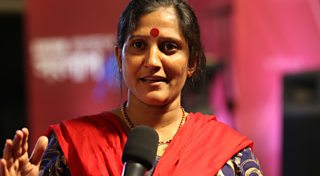‚ÄúPlease, ask my husband‚ÄĚ
Aniqa Hossain
Research Officer, ¬ť∂Ļ‘ľŇń Media Action Bangladesh
Tagged with:

A Sanglap audience member asks the panel a question
Women in Bangladesh tend to see political debate as "men’s business" but the female viewers of ¬ť∂Ļ‘ľŇń Sanglap are an exception.
Discussing politics over a cup of tea at a roadside stall is common practice for men - but not, it seems, for women – in Bangladesh.
I discovered this while conducting research for Sanglap (Dialogue), a political discussion TV show enabling Bangladeshis from all walks of life to question their leaders on the issues that matter to them. We wanted to find out who exactly is watching our TV show, and how it is helping improve people’s understanding of politics and ability to hold their government to account.
Staying silent
Most of the women we approached for an interview immediately came up with any number of reasons to avoid speaking about politics. It seemed that praying, cooking, child-minding or sleeping were more important topics of conversation. Time and time again, women told us, ‘please, ask my husband whatever you want to know.’ With a shudder I realised that I also chose to stay silent whenever my male colleagues embarked on their frequent debates.
The scenario was pretty much the same in all the households I visited.
We’d asked about some of the issues most discussed on Sanglap: political violence and the strikes that followed the 2014 national election. In line with my experience with the interviewees, it wasn’t a surprise to find that while only 2% of men didn’t want to talk about the issue, the non-response rate for women was 11%.
Lack of female engagement in politics isn’t a new phenomenon. We’ve observed the same patterns since the start of ¬ť∂Ļ‘ľŇń Sanglap in 2012. As one woman said during research, “As we are women, our major concern is our family, our children and our household activities. We are not interested in political discussions. The men are interested in those things.”
Encouraging women
It was a pleasure, then, to discover that the non-response rate was much lower among women who had watched or listened to Sanglap. In fact, the vast majority of female viewers told us that they were aware of the post-election violence of 2014, indicating a higher level of knowledge of political issues.
Despite these positive findings, reaching a wider female audience remains a challenge.
Our survey, taken at the end of our most recent series, shows that only 17% of the Sanglap audience is female – down from 29% in 2014. The reason for the drop may be that the 2014 national election increased interest in political talk shows, resulting in a higher reach among all groups, including women. When the election period was over these women became less engaged again, and Sanglap could only retain its most loyal audiences, who are largely male, educated and slightly more likely to live in urban areas.
Sanglap has always aimed to encourage more young and female audiences to participate in politics. We work hard to maintain an equal proportion of women and men in our studio audiences and have at least one female panellist each week.
Addressing the gender imbalance of political discussion in Bangladesh will always be a challenge, but there is some light at the end of the tunnel. For those women who did watch Sanglap, our research clearly shows that the programme has been effective in increasing women’s levels of knowledge about key governance issues. I can only hope that this translates into wider political discussion between women, and men in the tea-stalls, workplaces, kitchens and bedrooms of Bangladesh.
